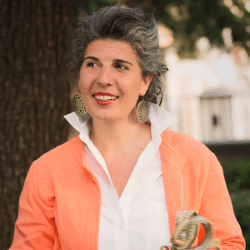Introduction
Amina Evangelista Swanepoel is dramatically changing the lives of women and youth in the Philippines by confronting the deep-rooted culture of stigma and misinformation surrounding reproductive and sexual health. By implementing an approach that prioritizes empowerment and community wellbeing, Amina is able to transform the discourse from a morally polarizing issue to one that recognizes reproductive rights as a vital aspect of the country’s overall health and development.
The New Idea
An overwhelming majority of Filipinos are unaware of reproductive rights and safe-sex practices. This is due to the prevalent culture of shame and contempt surrounding contraception, sexuality, and family planning - ultimately leading to the country’s rapidly increasing rates of maternal mortality, teenage pregnancy and HIV infection. Amina’s Roots of Health empowers women and young people to make informed decisions by addressing the underlying stigmatization that limits access to reproductive and sexual health resources in the Philippines.
Amina is effectively creating safe spaces that depoliticize the reproductive health issue. Her unique approach combines comprehensive reproductive and sexual education with access to free clinical care and services, as well as the establishment of strong community-based support systems. Instead of going head-to-head against anti-Reproductive Health (RH) advocates, Roots of Health positions itself as a culturally sensitive partner for local governments and agencies that are addressing the alarmingly high rates of HIV infection, maternal mortality, and teenage pregnancy. Roots of Health is able to teach students evidence-based information about RH in a way that refrains from judging women and young people for the choices that they make.
Amina has established a collective of local women (“Community Health Advocates”) living in geographically isolated and disadvantaged areas who are trained by Roots of Health on the use of contraception, safe sex practices, and maternal health necessities. They are then able to share this knowledge with others living in their communities, creating informal spaces where women can learn from their own peers, and ask questions they are often too afraid to ask traditional healthcare providers. Roots of Health has also piloted a similar program especially designed for youth (“Youth Advocates”) that does not only provide a comprehensive sexual health education, but also trains them to communicate this to their friends and classmates - encouraging more teens to be informed and responsible.
Both Community Health Advocates (CHAs) and Youth Advocates (YAs) are then able to refer their peers to the Roots of Health Clinic where they can access free clinical services - from reproductive health products, to pre/post natal care, and HIV testing. By establishing peer-led community support systems where individuals are able to seek advice and services from those they know and trust, Amina has been able to break down the barriers that prevent so many Filipino women and youth from living healthy lives.
The Problem
Due to cultural and religious norms in the Philippines in which sex and family planning are both perceived as taboo, women and young people have very limited access to information on reproductive rights, maternal health, and safe sex. This results in the country’s increasing rates of maternal mortality, teenage pregnancy, and HIV infection. The province of Palawan exhibits one of the most disconcerting reproductive health indicators in the Philippines. Palawan has the highest maternal mortality rate amongst all other provinces in its surrounding region, with women dying often of preventable complications from pregnancy and childbirth. The province’s teen pregnancy rate is higher than the national average of the Philippines - 1 in 4 births in Palawan is to a teen versus 1 in 5 for the entire country. Palawan’s capital, Puerto Princesa City, is currently categorized by the Department of Health as having epidemic levels of HIV infection, projecting that more than 5% of the population is infected.
The imminent cause of these poor health indicators is the stigma surrounding reproductive rights in the Philippines - manifesting as a lack of awareness amongst the general population and the widespread dissemination of misconceptions and myths regarding safe practices. For example, of nearly 4,000 students surveyed in Palawan in 2017, 71% believed that jumping up and down after sex would prevent pregnancy. Of the same survey sample, 40% believed that women could not get pregnant if it was their first time having sex.
This pressing reality is further amplified for rural women and youth living in geographically isolated and disadvantaged areas (GIDA). Communities and municipalities identified as GIDAs rarely receive any support. Even though there are city budget allocations to support healthcare services for some disadvantaged communities, resources usually run out the first quarter of the year before areas beyond urban perimeters are reached - leaving thousands of women without access to these vital services.
The extreme social pressures of these taboos lead to largely disjointed and restrained implementation of reproductive health initiatives by government agencies and social sector groups. This enduring stigmatization of reproductive rights is rooted in the prevalent influence of the conservative religious beliefs within Philippine society, and is reflected in mainstream health education. Programs regarding family-planning and sexuality are usually morality-based and focus on teaching abstinence only. Local health care programs provide RH services and products without adequate information. Conversely, there are educational programs that are raising awareness on reproductive and sexual health but fall short because their community members are unable to access the services and products that these programs discuss.
The Strategy
Amina realized that improving reproductive and sexual health indices in the Philippines required an approach that unifies comprehensive education with inclusive service provision, while addressing the cultural taboos that discourage women and young people from accessing these resources in the first place.
Amina grounds Roots of Health’s initiatives within a life-planning approach. Rather than preaching against abstinence or against promiscuity, women and young people are simply encouraged to think about their dreams and aspirations - prompting the awareness of how an unplanned pregnancy or illness would hinder one from reaching their goals, and most importantly, the realization that they do have the capacity to choose. In shifting the discourse from a morality-based perspective to one that plainly focuses on an individual’s ability to lead the life they want, the stigma surrounding RH is minimized - accessing contraception and reproductive services becomes an act of empowerment for women and young people in the Philippines.
Amina established Roots of Health to address the gaps in reproductive education and access to services, basing the organization in Palawan where the need is most urgent. Their education program targets both schools and communities. In addition to the foundational knowledge on reproductive health, their teaching modules incorporate more nuanced subjects relevant to youth from puberty, emotional changes, and healthy relationships. To further support their efforts in schools Roots of Health includes teachers in their program, equipping them with the capacity to give non-judgemental advice to students and refer them to clinical services when necessary. For all their school programs, Roots of Health conducts pre and post tests to track changes in knowledge, attitudes, and behaviors. The latest results for the reproductive health module showed that students scored more than 80% post-intervention on knowledge about pregnancy, contraception, and STIs, - also reflecting a good behavioral intent to use protection during sex. By 2017, Roots of Health had engaged over 50,000 high school students, teaching almost 20,000 in that year alone. In the same year, ROH taught over 6,000 women about their bodies and their health, as well as supported 72 Community Health Advocates who collectively care for 2,566 women in their respective areas. Amina works diligently with the Department of Education and Regional Health Offices, sharing data collected throughout their programs to help these institutions make relevant and effective policy decisions.
Roots of Health combines this learning-based approach with an extensive service provision program - providing free clinical services and reproductive health materials to thousands of women. For Amina, it is imperative that once women understand they have the capacity to manage their reproductive health, they must also have the ability to access the contraceptive options they decide are best for them. In 2017, Roots of Health met the contraceptive needs of 17,893 women. In 2017 they started a new partnership with the Department of Health which enabled them to provide contraceptive access to thousands of women living in geographically isolated and disadvantaged areas. Most recently, ROH founded their Youth-Friendly Service Delivery Network, training local midwives to provide non-judgemental healthcare to youth. They are also now creating Municipal Implementation Teams (MITs) for RH in several Palawan municipalities. The MITs are comprised of municipal government and health leaders as well as principals and teachers. Roots of Health believes these MITs will provide more enabling environments for young people to access the clinical services that they need.
Through their Community Health Advocate and Youth Advocate Programs, Amina has mobilized peer-driven communities that enable Roots of Health to amplify the impact of their work. In addition to contraceptive information and safe-sex practices, Community Health Advocates are being trained to recognize early warning signs of pregnancy complications, establishing community-based collectives of women actively working to reduce preventable maternal deaths. Recognizing the potential of youth-led campaigns, Roots of Healths trains their Youth Advocates to act as peer-advisers to their own friends, answering sensitive questions and referring those in need of services to the ROH clinic. Youth Advocates are also encouraged to take initiatives beyond peer-advising. One YA has set up an HIV Testing Center in Puerto Princesa, and another YA is partnering with local motel owners to provide free condoms in rooms, encouraging safe sex.
Roots of Health is actively expanding into policy and advocacy for women and young girls. They are working very closely with the Provincial and City Departments of Health as well as the Provincial Departments of Education to try and implement reproductive health programs that support the most underserved and resource-scarce communities. Roots of Health has seats on the Local Health Board and the Local Aids Council. Amina is currently a member of the Provincial Family Health Council of the Province of Palawan, and of the Provincial Maternal Death Surveillance and Response Council, enabling her to influence health policies and budget allocations at a regional scale.
Roots of Health recently joined the Humanitarian Response Consortium, a collective of Philippine-based organizations that work to provide care to populations impacted by disasters. Recognizing the evident lack of quality reproductive healthcare in these situations, Amina and Roots of Health will work to identify post-disaster needs, provide health kits and services for pregnant women, as well as contraceptive support. Being a part of the Humanitarian Response Consortium will enable Roots of Health to expand their work to even more regions of the Philippines.
The Person
Amina was raised in the Philippines by parents who instilled in her that girls could do anything boys could. This support was what fueled her to pursue leadership roles throughout her adolescence. When Amina moved to the United States to attend Wellesley College, she was an active leader in student government. During her time at the all-women’s college, Amina began to understand that her upbringing was not at all a universal reality for a majority of women all over the world. Deeply disturbed by these stark inequalities, Amina resolved to do everything in her power to improve the lives of other women and young girls. Amina spent the next few years learning about the kind of work being done to mitigate the issues affecting women globally. Immediately following graduation, Amina joined Human Rights Watch. Amina was the first associate in the history of the organization to help conduct a research mission trip, working to implement an HIV-related project in the Philippines. It was then that she was confronted with the unsettling truth about the nation’s inadequate reproductive health policies, dramatically endangering the lives of so many marginalized women and girls.
Amina’s mother was a professor at the local state university in Palawan. Through this, she learned about the alarming rate of teenage pregnancy and dropout rates amongst young female college students. Amina realized that in order to truly improve the lives of women in the Philippines, one must actively address the cultural context in which Filipina women come to understand reproductive rights and sexuality as something negative. In 2008, upon completing a dual Master’s program in human rights with a focus on reproductive and sexual health at Columbia University, Amina moved back to the Philippines, and started Roots of Health with her mother and her husband shortly after. Learning everyday from mothers who been having children since they were 14 or 15 years old, Amina’s work is continuously inspired by Roots of Health’s communities. Now a mother of two herself, Amina is reminded that above all, her commitment will always be to protecting a woman’s capacity to make informed decisions about her health and her future.




